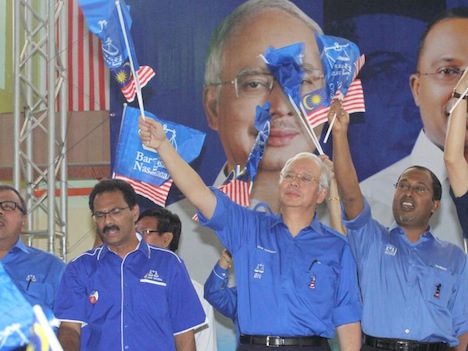Malaysia’s incumbent government, headed by prime minister Najib Razak, has won Sunday’s landmark parliamentary elections, returning the ruling Barisan Nasional (BN, National Front) coalition and its largest party, the United Malays National Organisation (UMNO), to power, extending the UMNO’s 55 consecutive years of rule.![]()
The race was the most closely contested in Malaysian history, with the opposition Pakatan Rakyat (PR, People’s Alliance) waging the most tenacious and successful campaign to date. If Pakatan Rakyat delivered a shock to Malaysia’s ruling elite in the March 2008 elections by depriving it of the two-thirds majority it had enjoyed (and with it, the power to amend Malaysia’s constitution), the May 2013 elections proved that the opposition can present a campaign with a genuine shot at winning.
The Pakatan Rakyat appears to have come up short — the Barisan Nasional will return to office, with Najib (pictured above) winning his first popular mandate since replacing his predecessor, Abdullah Ahmad Badawi, in 2009 following the poor results of the 2008 elections. According to official results, the Barisan Nasional will hold 133 seats (the UMNO holding 126 of them) to just 89 seats for the Pakatan Rakyat in the 222-member Dewan Rakyat (House of Representatives). That’s a 14-seat swing — seven seats less for the governing coalition and seven seats more for the opposition.
In one sense, it’s a win for the Pakatan Rakyat, which has had the best election result in Malaysian history, and it stands a good shot of building upon Sunday’s results to win power in the next elections. Najib’s role as prime minister may even be in doubt following the Barisan Nasional‘s less-than-vigorous victory. In another sense, it’s obviously a disappointment because the opposition failed to make sufficient inroads among ethnic Malays to win after a campaign that saw Malaysians divide largely on class, age and ethnic lines, with ethnic Chinese and ethnic Indians supporting the Pakatan Rakyat and a majority of ethnic Malays supporting the Barisan Nasional, despite a growing mass of younger and more urban ethnic Malays supporting the opposition.
Indeed, the Barisan Nasional‘s two other major constituent groups, the Malaysian Chinese Association (MCA) and the Malaysian Indian Congress (MIC), were nearly wiped out — the MCA won just six seats and the MIC none at all. Ironically, that makes the UMNO itself even more dominant, even as the result confirms that the Barisan Nasional has lost nearly all of its support beyond ethnic Malays, which bodes precariously for its future. Ethnic Malays constitute a little over 50% of the country’s population, while ethnic Chinese account for around 24% and ethnic Indians for 7%.
So what happened — what made the difference in Sunday’s election to push what was widely seen as a toss-up election to the incumbent?
Here are six reasons. Continue reading Six reasons why Malaysia’s BN-led government held on to power in Sunday’s election

